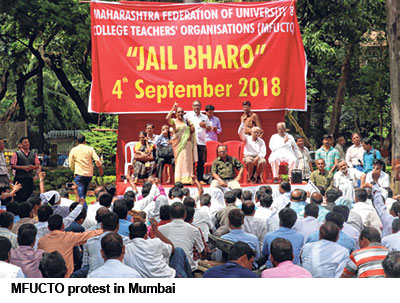 In maharashtra — india’s most industrialised state (pop.114 million) — 25,000 college and university teachers have been on an indefinite ‘cease-work’ strike since September 25. They are protesting poor pay scales and a huge number of teacher vacancies in the state’s government- funded higher education institutions.
In maharashtra — india’s most industrialised state (pop.114 million) — 25,000 college and university teachers have been on an indefinite ‘cease-work’ strike since September 25. They are protesting poor pay scales and a huge number of teacher vacancies in the state’s government- funded higher education institutions.
The Maharashtra Federation of University & College Teachers Organisation (MFUCTO) with a membership of 35,000 has stepped up its agitation in the past three months. On the eve of Teachers’ Day (September 5), 2,000 member-teachers convened at Mumbai University to court arrest, forcing the BJP-Shiv Sena state government to call for talks and promise to consider MFUCTO’s 11-point demand charter.
In its charter, MFUCTO has demanded immediate filling of 9,500 teacher vacancies in Maharashtra’s government-aided higher education institutions and implementation of 7th Pay Commission scales for college and university faculty. “Due to a freeze on faculty recruitment, in some colleges one teacher is teaching 130 students per class, as against the 1:20 teacher-student ratio prescribed by the University Grants Commission. This is compromising the quality of higher education dispensed in the state and could lead to a massive rise in the number of certified but unemployable youth,” warns Tapati Mukhopadhyay, president of MFUCTO.
According to Mukhopadhyay, against the requirement of 150,000 faculty, Maharashtra’s higher education institutions have 75,000. Under the complex rules and regulations prescribed by the government, state-owned and aided colleges are permitted to recruit full-time faculty subject to fulfilling strict criteria relating to the total number of lectures, students and divisions required for each course. Moreover, all recruitments have to be approved by the state’s joint director of higher education.
This cumbersome process has resulted in 9,500 vacancies filled even though the government’s education ministry has sanctioned 35,000 appointments. Since 1998 a partial ban on recruitment permitting colleges to employ one teacher for every two vacancies was followed by a complete recruitment freeze after the new Maharashtra Public Universities Act, 2016 came into effect in May 2017. However, institutions willing to bear the full cost of additional faculty were permitted to hire contracted teachers on ‘clock hour basis’ (CHB).
This has resulted in more than 50 percent of the current higher education faculty in the state working on CHB at a maximum of Rs.300 per hour, with many hired on 11-month contracts. Academia is awash with teachers who have passed the state eligibility test (SET) — an entry test that determines eligibility for college and university-level teaching — working on contract rather than tenured professorship. CHB faculty are normatively required to deliver more than 20 lecture classes that tenured assistant professors take during a week and chip in with administrative work as well. Little wonder CHB faculty complain they are over-worked and underpaid.
“Contracted teachers whose contracts are renewed every year are ineligible for promotion and other benefits that tenured faculty receive. Irrespective of experience and qualifications, they are paid Rs.10,000-20,000 per month (cf. the entry level Rs.65,000 of tenured faculty) and can be fired on one month’s notice. Unfortunately, the government has been encouraging government and aided colleges to recruit CHB faculty because it shifts the burden of paying 7th Pay Commission salaries from the state government to contracted wages by college managements. This is also the reason why the government is encouraging colleges to introduce a plethora of self-financed courses entirely funded by student fees,” adds Mukhopadhyay.
Consequently, there’s been a huge increase in the number of colleges offering self-financed programmes such as BMS (bachelor of management studies), BBI (bachelor in banking and insurance), BMM (bachelor in mass media).
The plain truth is that the BJP-led state government which received a massive mandate in the legislative assembly election of October 2014, and which is obliged to call the next assembly election within a year, is on a massive populist spending spree. Establishment, i.e, administrative expenses exceed 20 percent of its Rs.2.88 lakh crore Budget 2018-19 revenue and huge amounts are being spent on populist schemes and giveaways in the final year of its current term. Therefore, it is not paying faculty in state government-owned and aided colleges and universities 7th Pay Commission salaries. Hence the anguish and exasperation of faculty in higher education institutions in India’s most industrially advanced and self-proclaimed progressive state.
Dipta Joshi (Mumbai)




























